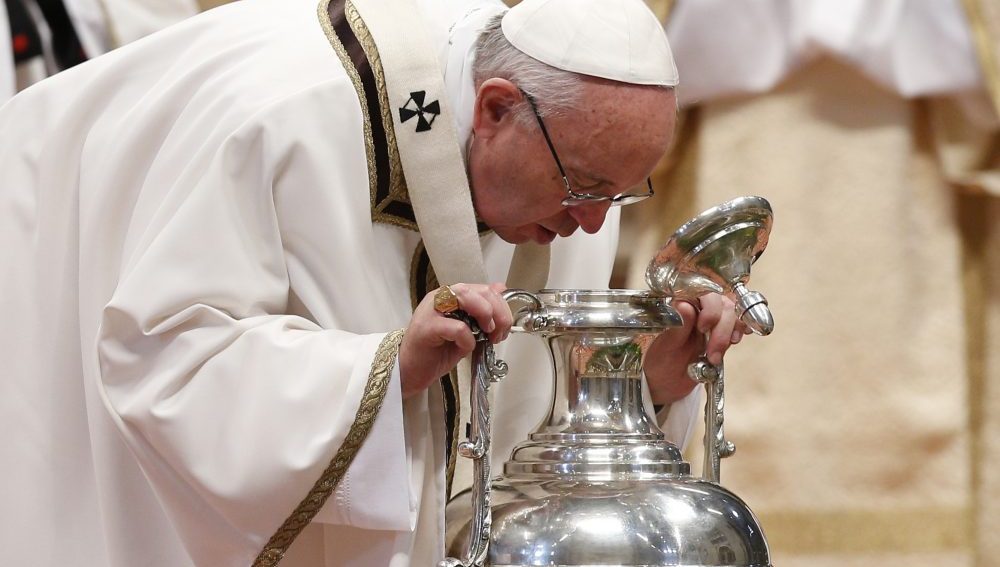

Deacon-structing: The Chrism Mass
Deacon Pedro
Sunday, April 9, 2017

Pope Francis breathes over chrism oil, a gesture symbolizing the infusion of the Holy Spirit, during the Holy Thursday chrism Mass in St. Peter's Basilica at the Vatican March 24, 2016. (CNS photo/Paul Haring)
These past few weeks I've been deacon-structing the Catechumenate and we've seen how Lent is a time to help us prepare for Holy Week and Easter.
Beginning with the Palm Sunday (or Passion Sunday) Liturgy, there are a few important liturgies that take place during Holy Week. In particular, we have Holy Thursday, Good Friday and the Easter Vigil which make up the Easter Triduum. Another beautiful Liturgy that takes place traditionally during Holy Week is one that is not attended by most lay people, but nevertheless has its importance and place during Holy Week. It is the Chrism Mass.
The Chrism Mass is the special Liturgy where the bishop of a diocese will bless the Oils (also called chrisms) that will be used in the various Sacraments throughout the year. In many places it is celebrated on Holy Thursday morning (that is when the Pope celebrates it) and it gathers all the priests of the diocese together with the bishop. Holy Thursday is the day when we commemorate both, the institution of the Mass, and of the Priesthood. This is why Pope Paul VI introduced into the Chrism Mass liturgy a renewal of the priestly commitment. This takes place just before the blessing of the oils.
 Every week, Deacon Pedro takes a particular topic apart, not so much to explore or explain the subject to its fullness, but rather to provide insights that will deepen our understanding of the subject. And don’t worry, at the end of the day he always puts the pieces back together. There are no limits to deaconstructing: Write to him and ask any questions about the faith or Church teaching: [email protected].
Every week, Deacon Pedro takes a particular topic apart, not so much to explore or explain the subject to its fullness, but rather to provide insights that will deepen our understanding of the subject. And don’t worry, at the end of the day he always puts the pieces back together. There are no limits to deaconstructing: Write to him and ask any questions about the faith or Church teaching: [email protected].
There are three oils that are blessed or consecrated: -The Oil of Catechumens (oleum catechumenorum or oleum sanctorum) -The Oil of the Infirm (oleum infirmorum) and -The Holy Chrism (sacrum chrisma)The Oil of Catechumens is used during Baptisms, in the consecration of churches, in the blessing of Altars and in the ordinations. During the Baptism liturgy, there is a Prayer of Exorcism where we ask to be delivered from Original Sin. This prayer is followed by an anointing on the chest with the Oil of Catechumens:
"We anoint you with the oil of salvation in the name of Christ our Savior; may He strengthen you with His power, Who lives and reigns forever and ever.”It represents healing and strength for the person being anointed. The Oil of the Infirm is the same oil that is used for the Anointing of the Sick, as it represents healing. When a person receives this Sacrament, the priest will pray:
"Through this holy anointing, may the Lord in His love and mercy help you with the grace of the Holy Spirit.”The priest then anoints the person's hands, saying,
“May the Lord who frees you from sin, save you and raise you up.”Depending on the person's illness another body part may also be blessed. Finally, the Holy Chrism is a mixture of olive oil and balsam. This oil is also used at Baptism, but also for Confirmation, Ordinations and at the consecration or dedication of Churches. It represents strength. The symbolism dates back to the time of the gladiators where they would grease themselves to show how strong they were. In the same way, oil symbolizes strength. During the Chrism Mass, the blessing of the Holy Chrism is different than that of the other two. Symbolizing the Holy Spirit descending, the bishop breathes over the vessel of chrism. At this time, the con-celebrants at the Chrism Mass extend their right hands toward the chrism as the bishop says the Consecration Prayer. This year, let's thank the Lord for the gift of His Sacraments and pray for your local bishop as he joins the priests of your diocese that they may continue to be faithful servants, guided by the Holy Spirit.
 Every week, Deacon Pedro takes a particular topic apart, not so much to explore or explain the subject to its fullness, but rather to provide insights that will deepen our understanding of the subject. And don’t worry, at the end of the day he always puts the pieces back together. There are no limits to deaconstructing: Write to him and ask any questions about the faith or Church teaching: [email protected].
Every week, Deacon Pedro takes a particular topic apart, not so much to explore or explain the subject to its fullness, but rather to provide insights that will deepen our understanding of the subject. And don’t worry, at the end of the day he always puts the pieces back together. There are no limits to deaconstructing: Write to him and ask any questions about the faith or Church teaching: [email protected].Related Articles:
<<













